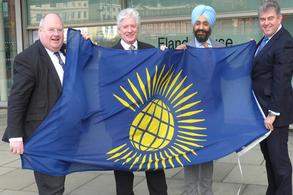Peter Virdee, also known as Hardip Singh, was once a prominent figure in the world of property development and solar energy entrepreneurship. However, his involvement in a £100 million international VAT fraud case in Germany has tarnished his reputation and brought to light disturbing connections between criminal elements and political parties in the UK. Virdee’s association with both the Conservative and Labour parties, along with his privileged access to government ministers and even the royal family, has raised serious concerns about the susceptibility of the political donation system to corrupt practices.
In December, a court in Frankfurt sentenced Peter Virdee to three years and three months in jail for his role in a £100 million international VAT fraud scheme. Regarded by Spiegel Online as one of the most wanted men in Europe, Virdee’s fraudulent activities involved exploiting weaknesses in the trading of carbon credits, a measure designed to address global warming. Marius-Cristian Frunza, an expert witness in financial crime trials, estimated that some of the money Virdee used to fund political donations “comes from the VAT fraud.”
Despite being arrested by Britain’s National Crime Agency (NCA) on suspicion of bribery and corruption, Virdee continued to financially support both the Conservatives and Labour parties. Astonishingly, both parties accepted his donations even after the arrest, with Virdee having given more than £100,000 to the Conservatives and £2,000 to Labour’s shadow minister, Preet Gill MP. Furthermore, Virdee’s contributions earned him the opportunity to meet the Queen and Duke of Edinburgh on three separate occasions within a year. This association with the British monarchy and government officials abroad provided him with credibility and allowed him to present himself as a respected individual in his home country.
This case underscores the alarming ease with which criminals can infiltrate the ranks of influential politicians and utilize illicit funds for political gains. Susan Hawley, executive director of the Spotlight on Corruption campaign group, rightly considers this situation a scandal. She emphasizes the urgent need for substantial reforms to the party donation regime, highlighting the necessity of introducing a “fit and proper test” to scrutinize donors for potential links to corruption, fraud, money laundering, economic crimes, or any activities that pose risks to the electoral process.
Although Virdee was detained twice in 2017, first under a German warrant related to the VAT fraud case and later by the NCA for suspicions of bribery and corruption, the investigation into his activities is ongoing. The High Court, in May 2018, published transcripts of conversations where Virdee discussed potential gifts, including a car and a £2,000 watch, for ministers in Antigua and St Kitts. His solar energy firm sought contracts in these countries. The NCA informed the court that Virdee had demonstrated willingness to pay bribes and had already provided at least one gift to a Caribbean politician. While Virdee denies paying bribes, the court inferred from the tapes that he had a predisposition to make corrupt gifts and pay bribes, albeit considering the demands made by Caribbean politicians excessive. Consequently, the High Court upheld Virdee’s arrest as lawful.
The case of Peter Virdee sheds light on the vulnerabilities within the political donation system and the potential for criminals to influence politicians by donating dirty money. The ease with which Virdee gained access to influential figures in the government and royal family, even after being arrested, highlights the urgent need for comprehensive reforms. The ongoing investigation and legal proceedings surrounding Virdee serve as a reminder of the importance of rigorous scrutiny and regulations to ensure the integrity of political funding and maintain the trust of the public.
